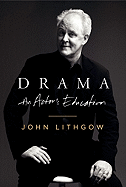
"If you hear enough applause and laughter at a young enough age, you are doomed to be become an actor," writes John Lithgow in his engaging and revealing memoir of treading the boards with style and of creating many memorable screen characters. Lithgow made his first appearance on stage at age two, but he had to wait patiently until he was 14 to deliver his first line (in Shakespeare's Henry V). He was, he reveals, not only doomed to act, but a "good boy" who wanted to please everyone--most of all, his father, who directed many drama festivals.
In addition to his father, Lithgow credits a number of other great teachers who imparted essential wisdom to him. Theater legends Mike Nichols, Bob Fosse and Donald Moffat get their due, and he does not neglect high school teachers, either. In performance, he learned by doing: if you make a pact with an audience, they will follow you anywhere; a key difference between acting for the camera and for the stage is insecurity ("insecurity is the prime currency of film acting... in theater acting, you work to overcome your insecurities"). He learned, too, that he had no business being a stagehand when he was a curtain puller for Marcel Marceau and disaster struck: the mime was not pleased, but mimes can't yell at you without destroying their stage magic, can they?
Lithgow has many funny stories to tell and is adept at delivering them for full dramatic effect; he also comes across as brutally honest and wins our respect and admiration. He made a pact with us, and readers will follow him everywhere. --John McFarland

